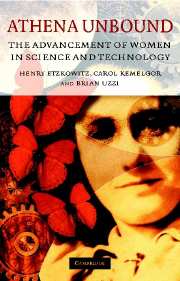Book contents
- Frontmatter
- Contents
- Acknowledgements
- Introduction: Women in science: Why so few?
- 1 The science career pipeline
- 2 Women and science: Athena Bound
- 3 Gender, sex and science
- 4 Selective access
- 5 Critical transitions in the graduate and post-graduate career path
- 6 Women's (and men's) graduate experience in science
- 7 The paradox of critical mass for women in science
- 8 The ‘kula ring’ of scientific success
- 9 Women's faculty experience
- 10 Dual male and female worlds of science
- 11 Differences between women in science
- 12 Social capital and faculty network relationships
- 13 Negative and positive departmental cultures
- 14 Initiatives for departmental change
- 15 International comparisons
- 16 Athena Unbound: Policy for women in science
- Appendix
- Bibliography
- Index
5 - Critical transitions in the graduate and post-graduate career path
Published online by Cambridge University Press: 08 September 2009
- Frontmatter
- Contents
- Acknowledgements
- Introduction: Women in science: Why so few?
- 1 The science career pipeline
- 2 Women and science: Athena Bound
- 3 Gender, sex and science
- 4 Selective access
- 5 Critical transitions in the graduate and post-graduate career path
- 6 Women's (and men's) graduate experience in science
- 7 The paradox of critical mass for women in science
- 8 The ‘kula ring’ of scientific success
- 9 Women's faculty experience
- 10 Dual male and female worlds of science
- 11 Differences between women in science
- 12 Social capital and faculty network relationships
- 13 Negative and positive departmental cultures
- 14 Initiatives for departmental change
- 15 International comparisons
- 16 Athena Unbound: Policy for women in science
- Appendix
- Bibliography
- Index
Summary
Graduate education is not a smooth continuum, with a steady rate of ‘leakage’ from the pipeline, but rather a discontinuous, turbulent flow, with attrition rates rising at certain key junctures (NSF, 1994). We have identified several specific points in the career trajectory when people are propelled forward, pushed out, or dropped down to a lower level. We call these points ‘critical transitions’. At the Ph.D. level these transitions are likely to include: (1) the qualifying examination, (2) finding a research advisor, (3) negotiating a dissertation topic, and (4) deciding what is sufficient work for the granting of the degree. Academic transition points sometimes coincide with events in the course of a life time that affect how decisions are made. Thus, for example, a student who is pregnant might have difficulty in finding an advisor, if decision makers view child-rearing and research as inherently incompatible.
The most crucial transition in the experimental sciences is the one from being a student in courses to becoming part of a research environment. A female graduate student described it as an apprenticeship: ‘You learn the part of being a physicist through interaction with other physicists.’ However, a belief permeates many departments, and is transmitted to incoming female students, that their admission is based on affirmative action rather than merit. Female students’ self-confidence is eroded by the attitude of faculty and male peers that women are less competent than men.
- Type
- Chapter
- Information
- Athena UnboundThe Advancement of Women in Science and Technology, pp. 69 - 82Publisher: Cambridge University PressPrint publication year: 2000



